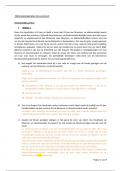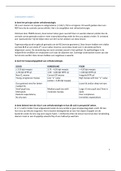Question 1
Discuss decoloniality in terms of the following;
a) Its criticism of coloniality of power, knowledge and being.
b) Efforts suggested mainly by Ndlovu Gatsheni and other decoloniality scholars on how to move
away from coloniality.
c) Your own views on whether efforts suggested are realistic or not. (50marks)
Introduction
Decoloniality is an approach aimed at addressing the long-lasting effects of colonialism on today’s world.
Colonialism did not simply end with the withdrawal of colonial powers from Africa, Asia, and Latin
America; rather, its impacts have continued, shaping power structures, systems of knowledge, and
personal and group identities. This continued influence is called “coloniality,” and decoloniality aims to
challenge and transform these structures. By looking at three main areas—power, knowledge, and
being—decoloniality seeks to highlight and dismantle these colonial impacts. Scholars like Ndlovu
Gatsheni, Walter Mignolo, and Nelson Maldonado-Torres have contributed ideas on how to challenge
these remnants of colonialism, offering various ways to create more inclusive and equitable systems.
This essay will discuss (a) the critique of coloniality in power, knowledge, and being; (b) suggestions by
Ndlovu Gatsheni and other scholars for addressing coloniality; and (c) a personal evaluation of whether
these suggestions are realistic.
a) Criticism of Coloniality of Power, Knowledge, and Being
Coloniality of Power Coloniality of power refers to how the systems and structures of colonial rule still
shape global power dynamics. During colonial times, European powers set up systems where they held
authority over land, resources, and people in Africa, Asia, and Latin America. Although these countries
are now independent, the structures built during colonial rule often continue to affect who has control
and access to wealth and resources. For example, many African and Latin American countries are still
heavily dependent on foreign aid or trade with Western countries. This dependency often influences
their decisions, giving former colonial powers an indirect form of control.
Moreover, political structures in former colonies often mirror those of their colonizers. Many African
countries, for instance, still use legal and governance systems modeled after British or French
institutions. This “coloniality of power” means that even though these countries are politically
independent, they are still affected by Western norms and systems that do not always suit their unique
social and cultural needs.
Coloniality of Knowledge Coloniality of knowledge addresses the idea that certain types of knowledge
are valued over others, often because they come from Europe or North America. During colonial times,
Western knowledge was seen as superior, while knowledge from African, Asian, or indigenous
communities was often disregarded. This continues today, with Western educational systems and
, perspectives dominating globally. Universities and schools often teach history, science, and literature
from a Western perspective, marginalizing indigenous and local knowledge.
This type of coloniality is significant because it affects how people see the world and understand their
own cultures. When Western knowledge is given more importance, it sends a message that local
knowledge is less valuable. This has a negative impact on cultural pride and identity, as people may
come to see their own knowledge systems as inferior. Decolonial thinkers argue that education and
knowledge systems need to be more inclusive, allowing for a diverse range of perspectives that includes
local, indigenous, and non-Western viewpoints.
Coloniality of Being Coloniality of being focuses on how colonialism has affected people’s identities and
their sense of self. Colonial powers often saw themselves as superior to the people they colonized,
which led to a long-lasting mindset of racial and cultural hierarchies. These views not only justified
colonization but also created a perception that people from the colonized regions were “less than” in
terms of culture, morality, and intelligence. This view has had serious, lasting impacts, as it still
influences how societies perceive race, class, and cultural value.
Coloniality of being often manifests in the form of internalized inferiority, where people from formerly
colonized nations may believe that Western ways of life, languages, and appearances are superior to
their own. This can create psychological challenges and even self-hate within communities. Many
African, Asian, and Latin American countries face this issue, as generations have been taught that
success often means adopting Western values and appearances, while local traditions are seen as old-
fashioned or backward. Decoloniality aims to change this, encouraging people to value their identities
and cultures.
b) Efforts Suggested by Ndlovu Gatsheni and Other Decoloniality Scholars
Ndlovu Gatsheni’s Contributions Ndlovu Gatsheni is a prominent scholar in decolonial studies. He
suggests that addressing coloniality requires a deep look at identity, knowledge, and cultural pride.
Gatsheni argues that African people, in particular, should reconnect with their histories and identities.
He believes that African countries need to reshape their educational systems so that they include local
perspectives, languages, and histories. This means going beyond simply adding African history to the
curriculum and instead creating a system where African ways of knowing and understanding the world
are central. According to Gatsheni, this could help to empower people, making them feel more
connected to their heritage.
Contributions from Other Scholars Other scholars have also proposed methods to address coloniality.
For instance, Walter Mignolo, a scholar from Latin America, has argued that decoloniality involves
rejecting the idea that Western perspectives are universal. Instead, Mignolo suggests that each region or
culture should develop its own way of knowing and being. He advocates for the promotion of
indigenous languages and knowledge systems as a way to resist coloniality. For example, instead of
teaching science only through Western theories, education systems should also recognize and teach
local ways of understanding the environment, medicine, and health.




